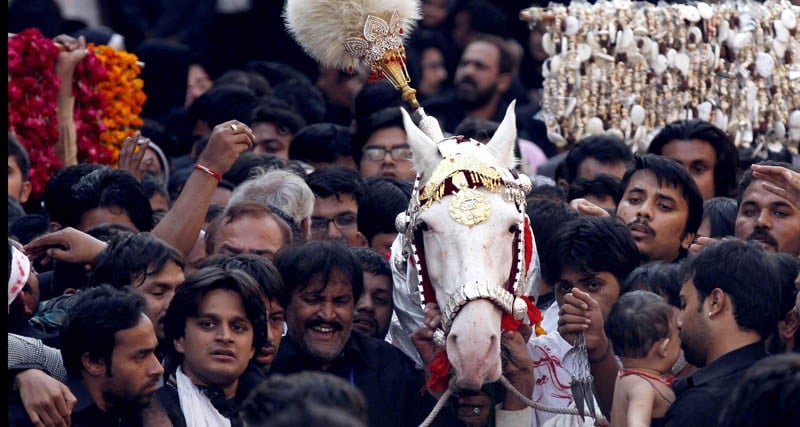

I had always wanted to go to a Muharram procession. The sea of black, people wailing, crying, and chanting with passion, and simply the charged nature of the procession has always fascinated me and I had long wanted to go and experience it for myself.
Last time, a friend of mine, a scion of the famous Fakir family, invited me to his ancestral house, Fakir Khana in the old city of Lahore to witness the main Muharram procession which hails from the Nisar Haveli, goes through most of old Lahore, and the Fakir Khana, to Karbala Gamay Shah, near the shrine of the patron saint of Lahore, Data Ganj Bakhsh. Even though I was going to watch the procession from the rather safe confines of the Faqir Khana, I was a little worried about security.
The rampant attacks on Shias recently have obviously alarmed people. However, I was energised by the strong faith of my Shia friends who seemed undeterred by such attacks. One friend even showed me a message from his mother where she had asked him to be ‘careful’ but did not say that he should not go to the procession. This small incident made me further understand the importance of Ashura today. Just as Imam Hussain was undeterred by the stronger forces of Yazid against him and stood for righteousness, so too are his followers bravely facing the evil forces which are trying to annihilate them. This spirit of sacrifice amidst strong persecution is what kept Hussain going and is what also fuels these processions.
I got to the Fakir Khana just past 1pm and from then onwards there was a long wait for the main procession and the sight of the ‘Zuljina’ the decorated horse which is supposed to represent the horse on which Imam Hussain rode. Interesting here was the communal nature of the event -- people were coming in and out of almost every house in the area, men and women were intermingling without much fuss, and children were almost in a festive mood. In an age when community ties are breaking up, even within close knit societies, the feeling that the whole area was just one extended household was heart warming.
I stood on the terrace of the house, together with the family members, a number of random people, for almost four hours waiting for the main procession. The sense of excitement and anticipation was patent as almost everyone was pacing up and down trying see if the procession had moved forward from Mubarak Haveli just up the road.
Finally, with a lot of shouts of ‘Labaik Ya Hussain’ the procession neared the house and the spare horse was brought into the house, to prepare it as the ‘Zuljina.’ Apparently, due to the fact that the procession actually began the night before, and that thousands of people throng to touch the Zuljina, the horse usually gets tired and disoriented, and therefore needs to be changed every now and then. The Faqir Khana being the last significant stop before the end of the procession then becomes the final changeover stop.
It was a great privilege, not only to see the procession but also closely view how the new horse is prepared as the Zuljina with items representing the martyred Imam. Then after veneration, the Zuljina left the Faqir Khana with the almost deafening shouts of mourning and praise for Imam Hussain towards its final stop -- Karbala Gamay Shah where the final narration of the battle took place.
In the end one comment by a Shia cleric remained with me. He said: ‘Imam Hussain, is not just a martyr for Muslims, he is there for people from every religion and none, as a symbol of hope for righteousness and resistance against tyranny.’ Surely, it is this intensely personal and human dimension of his martyrdom which makes Hussain such a beacon and makes people attached to his memory. The non-sectarian, and even pan-religious, nature of the appeal of Hussain is also remarkable in bringing together people from different viewpoints. The existence of the so-called Hussaini Hindus -- caste Hindus who venerate Hussain -- in Lahore is clear evidence of such an appeal.
However, in the recent past we have made Ashura a ‘Shia’ event, Hussain a ‘Shia’ figure, and the procession a target for violent attacks -- all this in a country where ‘Muslims’ (not just Sunnis) and others, could remain peacefully. I am sure that if Jinnah, the founder of the country, were alive now, he too would have been attacked -- after all he was a ‘Shia’ too.